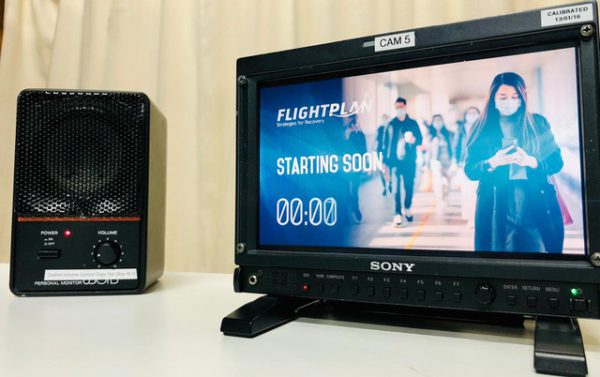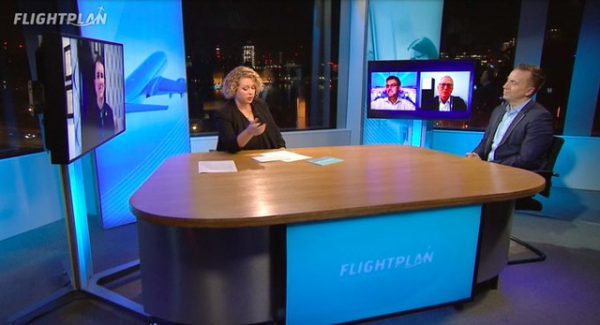SINGAPORE, 17 November 2020: Leaders from across the global aviation industry explored strategies to accelerate recovery and combat losses inflicted by the Covid-19 pandemic during an aviation industry broadcast at the weekend.
More than 3,500 viewers logged on the session ‘FlightPlan: Strategies for Recovery’, hosted by Inmarsat Aviation and the Airline Passenger Experience Association (APEX). The event focused around 50 industry leaders who presented observations on the present and future of aviation.
Six months down the road from the first FlightPlan broadcast event in April, the November the latest broadcast concluded that aviation remains in the depths of one of its most crippling crises to date.
Summarising, Inmarsat Aviation president Philip Balaam commented: “A wide range of initiatives have already been executed to make flying viable and safe – from an overhaul of cleaning protocols to greater social distancing across the passenger journey. Under different circumstances, many of these changes could have taken years to introduce. The next phase will delve even further into the passenger mindset, ensuring that consistent policies, measures and technologies are implemented to restore confidence in airline travel.”
Inmarsat also used the broadcast to launch its ‘Passenger Confidence Tracker’, a survey of airline passengers since the pandemic began.
Reflecting the views and attitudes of almost 10,000 respondents from 12 countries, it revealed that 83% of air passengers expect their travel habits to change in the long-term as a result of Covid-19.
Reflecting on takeaways from the study that could rebuild confidence, Inmarsat Aviation’s senior vice president of inflight business, Niels Steenstrup said: “The fundamental message is about consistency. Passengers want to be able to board a plane anywhere and be confident that the same hygiene practices are being followed. They want a consistent set of safety standards around the world and more consistency on quarantine rules.”
He continued: “Worries about flying are all too often a result of inconsistencies and lack of assurance about what they will be met with at the airport, on the plane or at the destination. Cooperation between nations will undoubtedly help restore passenger confidence.”
CAPA Centre for Aviation chairman, Peter Harbison, added that “a harmonious and standardised way for looking after passengers” was needed.
“The biggest problem is the unilateralism we have seen develop.”
Another key theme was the growing relevance of trust and reputation. The ‘Passenger Confidence Tracker’ showed that 44% of passengers believe reputation is now a more significant factor when choosing an airline than it was pre-pandemic.
“Trust is supercritical for any brand, but certainly for those that have a safety component like airlines,” said Air Canada head of Brand experience Anton Vidgen. “It was important before the pandemic, and it’s especially important during the pandemic.”
There was a clear focus throughout FlightPlan on the importance of digital solutions as a short-term solution to boost confidence and safety, through reducing touchpoints and interactions throughout the journey experience.
Travellers are increasingly reliant on self-directed resources to get information about their travel experience. Airports and airlines will be required to accelerate their digital transformation in a way that increases the independence of the traveller and reduces their reliance on touchpoints.
Airline leaders echoed this, arguing that the pandemic has accelerated their digital transformation plans. Vidgen noted that Air Canada has already adopted the touchless bag check and is exploring innovative technologies from biometrics to automatic gate boarding. Implementing touchless technologies throughout the journey, he believes, will ensure “that customers feel confident and can serve themselves as much as possible”.
Research from the Passenger Confidence Tracker pointed to the importance of value-added services – such as extra legroom and free baggage – becoming increasingly important to passengers in 2020.
Despite the deep challenges facing aviation, FlightPlan speakers expressed positivity in how the industry has adapted at speed and shared optimism for the recovery phase.
Delta Air Lines SVP alliances, Perry Cantarutti, commented; “we’re learning to realise that we can’t let it [Covid-19] conquer our ability to live our lives and run our businesses, but we have to be able to do that in a safe way”.










I have heard a lot of complaints from people not using their masks on different American Airlines and an apparently a *don’t care* attitude coming from the cabin staff . This breeds concern and fear from prospective travelers and should be dealt with immediately. In these uncertain times every traveler should be able to fly as safely as possible. A big fine and eventual banning should be widely advertised before booking and boarding .